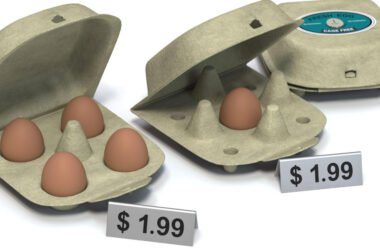Customers in recent times have embraced “purchase now, pay later” loans as a straightforward, interest-free strategy to buy every thing from sweaters to live performance tickets.
The loans usually are usually not reported on shoppers’ credit score studies, nevertheless, or mirrored of their credit score scores. That has stoked issues that customers could be taking up an outsize quantity of debt that’s invisible to each lenders and monetary regulators.
So in February, when Apple introduced it could begin reporting loans made by means of its Apple Pay Later program to Experian, one of many three main U.S. credit score bureaus, it appeared like a watershed second for the fast-growing “purchase now, pay later” class.
However not one of the different main pay-later suppliers have adopted Apple’s lead. And whereas credit score bureaus and lenders say they’re concerned with discovering a strategy to work collectively, the gulf between the 2 sides stays broad — a lot in order that some pay-later corporations are exploring creating another credit score bureau to deal with their loans.
“I haven’t seen actually significant progress,” stated David Sykes, chief business officer of Klarna, one of many largest pay-later corporations.
“Purchase now, pay later” loans permit shoppers to pay for purchases over time, typically in 4 installments over six weeks, curiosity free. They surged in reputation through the pandemic, after they helped gas an online-shopping increase. The speedy development has continued: The retail trade attributed its record-setting vacation gross sales partly to the recognition of pay-later merchandise.
However economists at Wells Fargo warned final 12 months that “phantom debt” from pay-later loans “may create substantial issues for the patron and the broader financial system.”
The credit score bureaus argue that incorporating pay-later loans into the reporting system would profit shoppers, who may construct credit score by repaying the loans on time, and lenders, who would acquire fuller perception into shoppers’ borrowing.
The pay-later suppliers agree — in principle. However they fear that reporting the loans would find yourself hurting their clients. Current scoring fashions penalize debtors who take out many loans in a brief interval. That could possibly be an issue for the pay-later trade as a result of, in contrast to bank card purchases, every pay-later transaction is handled as a mortgage.
Some shopper advocates share that concern.
“The credit score reporting system is a system that assumes month-to-month funds, it assumes longer-term loans, and it simply isn’t actually minimize out to deal with ‘purchase now, pay later,’” stated Chi Chi Wu, senior lawyer on the Nationwide Client Regulation Heart. “It’s a square-peg, round-hole type of factor.”
The buyer reporting trade in america has advanced over the a long time to change into a fancy net of impartial and typically competing gamers. Monetary establishments — banks, mortgage brokers, auto lenders and others — report info on loans to 3 main credit score bureaus: Equifax, Experian and TransUnion. These bureaus compile the info and supply it to lenders and shoppers, and in addition to corporations like FICO and VantageScore, which use it to provide credit score scores.
The key credit score bureaus say they addressed the pay-later trade’s issues greater than two years in the past after they created a class for the loans. That ought to permit FICO and VantageScore to regulate their fashions to account for these loans’ distinctive traits — and finally to include them into credit score scores with out penalizing customers. (For now, the loans could be included on shoppers’ credit score studies however not seen to lenders or included into scoring fashions.)
“It’s been an extended highway, however I believe that we’re lastly hitting a turning level within the momentum towards getting the info reported,” stated Liz Pagel, a senior vp at TransUnion who oversees the corporate’s shopper lending enterprise.
The pay-later trade, nevertheless, argues that the credit-reporting system nonetheless isn’t prepared. For one factor, the credit score bureaus primarily obtain knowledge from lenders month-to-month, whereas pay-later loans are usually paid biweekly. (All three main credit score bureaus stated that whereas month-to-month reporting was the default, lenders may report extra ceaselessly if they need.)
“It’s simply not fit-for-purpose but,” Mr. Sykes of Klarna stated. “And we haven’t seen something from the bureaus that recommend it’s about to be.”
Klarna studies loans to TransUnion and Experian in Britain, the place the system works considerably in a different way. A rival, Affirm, studies some longer-term loans to Experian in america and says it hopes to report shorter-term loans “ultimately.”
Different main pay-later suppliers, like Afterpay, PayPal and Zip, stated their issues with the credit score reporting system’s dealing with of pay-later loans had not been resolved.
“Our members proceed to say it’s nonetheless insufficient,” stated Penny Lee, president of the Monetary Expertise Affiliation, which represents lots of the largest pay-later corporations.
That argument took a success in February, nevertheless, when Apple introduced that it could start reporting loans made by means of its “Apple Pay Later” product — basically a duplicate of the pay-in-four loans supplied by Klarna, Afterpay and comparable corporations — to Experian.
Apple declined to remark, however in an earlier information launch stated that whereas the loans wouldn’t instantly be included into credit score scores, it noticed the transfer as a step towards “offering customers with the chance to additional construct their credit score.”
Silvio Tavares, chief government of VantageScore, stated in an interview that Apple’s announcement confirmed the credit-reporting system’s capacity to deal with pay-later loans.
“It’s robust to be extra subtle than Apple,” he stated.
Removed from becoming a member of Apple, nevertheless, pay-later suppliers look like exploring a system exterior the standard credit score reporting infrastructure. Final 12 months, two former trade executives based Qlarifi, a data-aggregation platform particularly for pay-later loans. (Mr. Sykes of Klarna is an investor.)
Alex Naughton, who left Klarna final 12 months to assist discovered Qlarifi and is now its chief government, portrays the corporate as a nimble, extra tech-savvy credit-reporting strategy. It will likely be capable of gather and share knowledge in actual time slightly than month-to-month, the usual for the main credit score bureaus.
“I don’t assume the present infrastructure is ready to adapt as shortly,” he stated.
The lenders and the credit score companies agree that pay-later loans are unlikely to stay exterior the credit score scoring system without end. However it’s unclear what’s going to break the logjam. Finally, trade consultants stated, it can most likely boil all the way down to one in every of two issues: Both regulators will pressure pay-later corporations to begin reporting or market forces will.
“Both it’s going to be a market shift or it’s going to be a regulatory shift,” stated Shane Foster, a lawyer at Greenberg Traurig who focuses on monetary regulation.
Regulatory motion appears unlikely quickly, at the very least on the federal degree. The Client Monetary Safety Bureau has hinted that it want to see pay-later loans included into the credit score reporting system. However whereas the company oversees the credit score reporting trade — imposing insurance policies to make sure that the info is correct and that shopper rights are protected — it hasn’t tried to require personal corporations to supply knowledge to the bureaus.
A number of states, together with California, have taken motion to control the pay-later trade, and others, together with New York, are contemplating doing so. However these efforts wouldn’t instantly require the loans to be reported to credit score bureaus.
Banks and different conventional lenders report back to the credit score bureaus as a result of the info is useful in lending selections and since it offers a stick with encourage debtors to repay: In the event that they don’t, their credit score scores will undergo.
Pay-later suppliers could not really feel a lot stress to start reporting as a result of their enterprise is rising and most shoppers are making their funds, stated Ted Rossman, senior trade analyst at Bankrate. But when the financial system slows and extra shoppers begin falling behind on funds, lenders would possibly resolve they should be a part of the credit score reporting system to guage debtors’ reliability.
“Delinquencies are fairly low, the job market’s been strong, so possibly that’s not created the identical urgency,” he stated. “‘Purchase now, pay later’ has but to have its actual delinquency reckoning. Individuals hold warning about it. Perhaps that may finally be what spurs change right here.”








